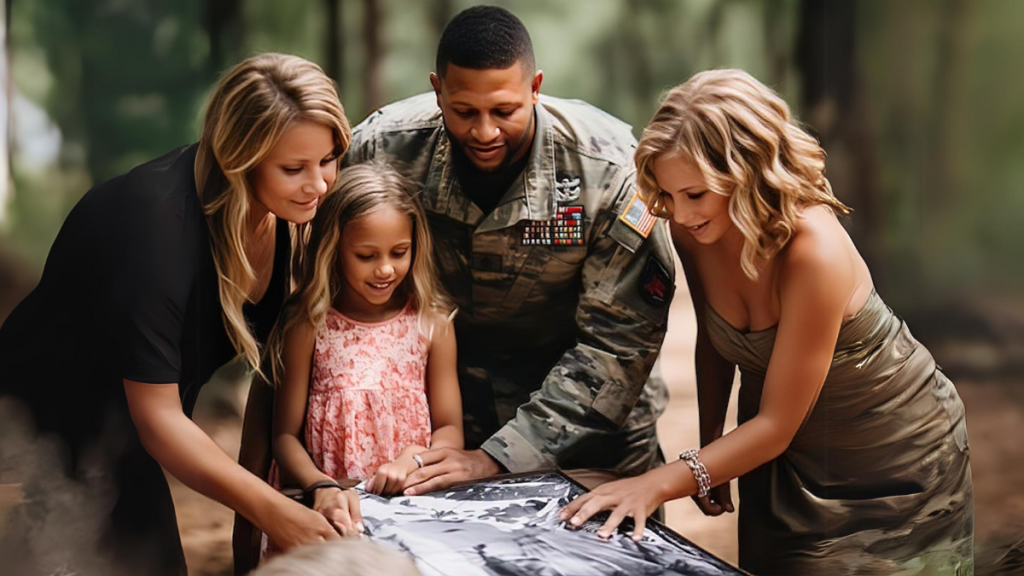Exploring your family’s military history can be a fascinating journey into the past, revealing stories of heroism, resilience, and the personal sacrifices your ancestors made. Whether you’re a seasoned genealogist or just starting, here are some effective strategies to help you uncover the military chapters of your family’s story.
Discovering Old Photos
One of the most thrilling moments in family history research is finding old photographs, like those that might be tucked away in an attic. These images can sometimes include uniforms and insignia that help identify the military branch or unit. If these photos are faded or damaged, modern technology comes to the rescue. Pic editors like Adobe Express picture editing tools can enhance these images to better reveal details that are not initially visible, helping to clarify ranks, medals, or other significant elements. This not only aids in your research but also helps preserve these precious memories for future generations.
Start with Family Conversations
Family discussions might be a great place to start when looking into a family member’s military history. Conversations like this can open doors to archives, personal tales, and other resources that are not available through formal channels.
Here’s how to handle these conversations in an effective manner:
1. Collect Narratives from Your Family
Start by having discussions with various family members who have firsthand or secondhand knowledge of the ancestor’s military service. In particular, elderly relatives might have firsthand knowledge or have heard stories from earlier generations. Ask open-ended questions to elicit detailed responses, and pay special attention to any anecdotes or experiences they provide.
2. Look for Records and Pictures
As you speak, find out if there are any records, letters, pictures, or personal items pertaining to military service. These things could offer vital insights such as dates and locations relevant to their service time along with detailed specifics. Images might also provide insight into the time period in which your relative served or highlight a specific unit they were a part of.
3. Keep Information Organized and Documented
When gathering data, take great care to document and arrange it. During talks, take thorough notes or record using a digital recorder. This information will be extremely useful for cross-referencing with official military records and internet databases, as well as for future research.
4. Investigate Leads Further
Listening closely to family stories might provide important information about military service. Look for any references to dates, localities, or wars; they might help you track down more information in military archives, libraries, and internet databases set aside for that purpose.
Starting with family conversations not only helps gather important data but also preserves firsthand narratives and personal stories, adding a great deal to your family’s military history.
Look for Physical and Digital Records
Once you have some names and details, start looking for more concrete records. National archives, like the U.S. National Archives and Records Administration (NARA), hold military service records, draft registration cards, pension records, and more. For those outside the U.S., similar institutions exist, such as the National Archives in the UK, which offers a wealth of service records and military histories.
Utilize Online Resources
There are numerous online platforms and databases that can aid in your research. Websites like Ancestry.com, Fold3, and FamilySearch.org offer access to military records, draft cards, and other historical documents. These resources can be invaluable in piecing together the military service of your ancestors.
Visit Local Libraries and Historical Societies
Don’t underestimate the value of local libraries and historical societies. Often, they hold unique collections like newspaper archives, personal letters, and other documents that are not available online. These resources can provide rich details about your ancestor’s military experience and the context in which they served.
Engage with Military Museums and Memorials
Military museums and memorials often have archives and exhibits that can provide context and additional information about the units in which your ancestors served. They can also be a powerful way to connect more deeply with the personal experiences of your relatives during wartime.
Explore Specific Regimental Histories
If you know the specific regiment or unit in which your ancestor served, look for books or documents that detail these groups’ histories. These records can provide insights into the battles they fought, the locations they were stationed, and the roles they played during their service.
Check Cemetery Records
Military gravestones can provide essential data, including enlistment dates, ranks, and the branches served. Many cemeteries have records online, but visiting in person can also yield valuable information and a personal connection to your family’s military past.
Attend Military Reunions and Talks
Attending reunions and talks can connect you with other families and veterans who served in the same unit as your ancestor. These can be excellent opportunities to gather personal stories and additional information that might not be recorded in official records.
Use Social Media and Forums
Platforms like Facebook, Reddit, and specific genealogy forums can be excellent resources for advice and information sharing. Joining groups related to military genealogy can help you connect with experts and others who are also researching their family’s military history.
Look for Letters and Personal Narratives
Letters sent during service can be incredibly revealing. They provide a first-person perspective of military life and the emotions and experiences your ancestor went through. Check with your relatives to see if any letters have been preserved. You could also take pictures of these letters and use a photo editor to enhance them to make clear softcopies.
Researching your family’s military history is not just about collecting dates and facts; it’s about understanding the lives and sacrifices of your ancestors. It’s a way to honor their service and preserve their stories for future generations. With patience and persistence, you can uncover the military chapters of your family’s past, ensuring their legacies are remembered and celebrated.




